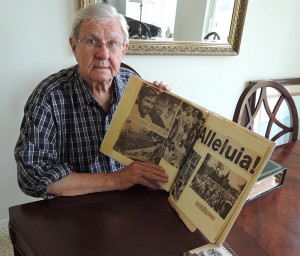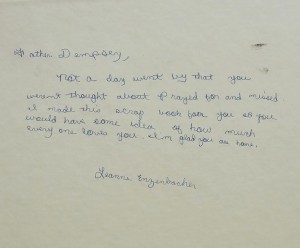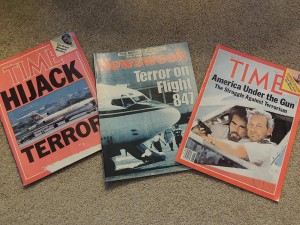Recollections of Faith, Hope & Prayer
Lynne Conner — July 1, 2015
Msgr. Dempsey holds scrapbooks that were compiled for him by members of his parish while he was being held hostage. Photos by Lynne Conner.
For one day, June 30, 1985, the top news story for media outlets world-wide was a positive one. Around that time, The Observer Catholic newspaper of the Rockford Diocese simply printed the large headline Alleluia! The paper was heralding the return of a religious pilgrimage group who had been held hostage in hijacking of TWA flight 847. The group, mainly from St. Margaret Mary Parish in Algonquin and St. Peter Parish in Geneva was accompanied by three priests of the diocese: Msgr. James McLoughlin, Msgr. P. William McDonnell and Msgr. Thomas Dempsey. The unrelenting stress and unimaginable stakes of that hostage situation has evolved into a story of faith, prayer, and hope.
Now, on the 30th anniversary of the hijacking, Msgr. McLoughlin, Msgr. Dempsey and former hostage, Margaret Johnson reflect on how this international crisis shaped, deepened and revitalized their Catholic faith.
The hijacking of flight 847 began on June 14, 1985 in flight over Athens when Hezbollah terrorists diverted the plane to the Middle East. Thus began a multi-day ordeal in which the plane was flown back and forth between Beirut, Lebanon and Algiers, Algeria. Early in the hijacking, all the women from the diocesan group including Margaret Johnson of Aurora, and Msgr. McDonnell were released by the terrorists and allowed to exit the aircraft. Upon the aircraft’s final landing in Beirut, 39 male passengers including Msgr. McLoughlin, Msgr. Dempsey and Deacon Raymond Johnson were taken off the plane and into the city where they were separated and held at various locations for a total of 17 days. The hijacking saga finally came to an end on June 30 when the group of 39 was released and ultimately arrived safely in the United States by early July.
Rockford accountant Al Johnson was just weeks away from his wedding when he got the news that his parents, Raymond and Margaret Johnson had been taken hostage aboard flight 847. The deacon and his wife of Aurora were traveling with the pilgrimage group.
“It was the longest 17 days of my life and on top of that, we were in the final stages of wedding planning,” Al said. His voice broke as he remembered an especially poignant moment of the ordeal, “At one point, my brother Joseph got a phone call from my father who told him, ‘All the plans for the wedding are to go on, no matter what.’” Deacon Johnson was to preside at his son’s marriage ceremony on July 6th. Al recalled how the eager prayers of all six Johnson siblings turned into sheer joy once their parents returned to the States.
“Living through this horrendous time really cemented some family members’ relationship with the Lord,” Al said. “Before the hijacking, we were a caring family; but we didn’t hug or kiss each other very much. Since the hijacking, our family has become a lot more affectionate with each other and family relationships have been healed. Our family has come to know the joy of family relationships to a much greater extent because of the emptiness we would have known if we had lost our parents.”
At the age of 90, Margaret Johnson of Aurora still vividly recalls the events surrounding the hijacking. “At first, I didn’t know what was happening…after a short time, it became apparent that we were being hijacked and I thought, ‘The only thing that’s going to get us out of this is God,’” she said. Margaret remembers the strain of having to sit for hours bent over with her head down or face violence at the hands of the terrorists.
“All through this terrible experience, I was praying,” Margaret said. “I tried to say the rosary; but I just could not keep my mind on the rosary…All I could do was pray, ‘Jesus, help me; Jesus help us. Prayer was what got us out of this horrible situation. It was all the prayers of the hostages and all the prayers of the people back home in our churches. To this day, I’m convinced that’s saved us.”
Margaret says that enduring and surviving the hijacking experience drew her family closer together. “During the hijacking, I wasn’t afraid to die, I really didn’t fear death; but I felt that I hadn’t said good-bye to my kids and that was the worst feeling for me,” she said. “This experience really stressed to us how important family is. Tell your children and spouse that you love them; make a point to say it so they will all know it.”
For Msgr. McLoughlin and Msgr. Dempsey, the first few days of the hijacking were only the beginning of a harrowing ordeal that would test them emotionally and spiritually. Msgr. McLoughlin remembers, “…I worried that somebody would try and cross the hijackers, but they both had hand grenades in their hands and one had a pistol, so I thought that would be a mistake (to cross them) because then we would all be killed.” Msgr. Dempsey also believed that the hostages’ matter of fact behavior throughout the hijacking probably saved lives.
“…We just did what we were told to do and we realized that we were not in control,” he said.
The lack of control over their situation eventually gave way to a safe landing, being allowed to leave the aircraft and staying alive for 17 days in Beirut. These were just some of the graces Msgrs. McLoughlin and Dempsey credit to power of prayer. “Certainly we all prayed,” Msgr. Dempsey said. “This was either the end of our lives or somehow we might get free.”
“I think that things happen for a purpose,” Msgr. McLoughlin said. “For me, I had wonderful spiritual experience at the time this happened and I felt very close to the Lord…I experienced His presence, peace and power all through this ordeal.”
One of the most empowering and faith deepening experiences Msgr. Dempsey remembers is leading a daily prayer group with fellow hostages. “We prayed every day publicly (while being held in Beirut). We made up scriptural services and each of the guys in our group would read from the Bible or say a prayer,” he said. “…Because they (the terrorists) did their prayers in front of us; we always ended our prayers by standing up and saying the Our Father.”
With a Bible borrowed from Deacon Johnson, Msgr. Dempsey said that preparing for the daily prayer group helped to keep everyone’s focus on hope and survival. “The affirming thing about our prayer group was that even if I didn’t prepare something, the others would say, ‘Come on, Tom, how about our prayer service?’ So then I would put something together and we prayed every day.”
Parishes across the diocese held prayer vigils for the hostages that happily turned into thanksgiving Masses upon their safe return. “The obvious outpouring of support from all over the diocese was shocking to our family,” Al Johnson recalled.
Adjusting to life after the hostage ordeal was different for Msgr. McLoughlin than it was for Msgr. Dempsey. “Coming home was exciting at first, but then I started to notice that I was tired in the morning when I woke up after a full night’s sleep. I knew that could be a sign of depression, so I got counseling from a priest in Chicago who was doing a study on post-trauma syndrome,” Msgr. McLoughlin said.
Msgr. Dempsey viewed his re-entry into parish life as a chance to ‘pick up where he had left off’. “I was just happy to be home, it was wonderful that it was over,” he said. “I just wanted to move on with life. I was home for a day, went back to the rectory and Father (Stephen) St. Jules walked into my office, looked at me and said, ‘You’re home, you can have your job back, I don’t want it.’”
For his part, Msgr. McLoughlin has spent time since the hijacking learning more about the Middle East. “I decided to do what I could to further understand why this had happened. Through study, night courses and joining an Arab American group; I discovered that the media in this country has a slanted view of the Middle East. I had accepted this view until my experiences in Beirut,” he said. Msgr. McLoughlin has made several trips back to the Middle East hoping to gain a better understanding of this region, its people and its culture.
Speaking to church and school groups about the hijacking has helped Msgrs. McLoughlin and Dempsey put the experience into perspective. Margaret Johnson and her late husband Raymond have shared their experiences with several church groups, as well.
Time has helped to fade the mental anguish and emotional trauma Msgr. McLoughlin, Msgr. Dempsey and Margaret Johnson experienced as hostages of flight 847. In the passing of 30 years, they have turned the ugliness of this international nightmare into vibrant life lessons of faith, hope, prayer, personal determination and understanding. And that’s the kind of good news the world needs more of.





